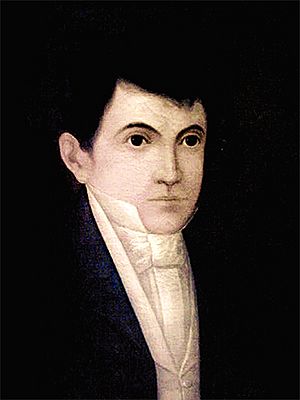Mariano Melgar facts for kids
Quick facts for kids
Mariano Melgar
|
|
|---|---|
 |
|
| Born | 10 August 1790 |
| Died | 12 March 1815 (aged 24) Umachiri, Peru
|
| Nationality | Peruvian |
| Education | National University of San Marcos |
Mariano Lorenzo Melgar Valdivieso (born August 10, 1790 – died March 12, 1815) was a brave Peruvian revolutionary, a talented poet, and a patriot soldier. He fought for Peru's independence from Spain.
Melgar is known as one of Peru's most important romantic poets of the 1800s. He is especially famous for his love songs called yaravíes. Many people see him as a national hero, much like José Joaquín Olmedo in Ecuador or José Martí in Cuba.
Contents
The Life of Mariano Melgar
Early Years in Arequipa
Mariano Melgar was born in Arequipa, Peru, on August 10, 1790. His parents, Don Juan de Dios Melgar y Sanabria and Doña Andrea de Valdivieso, came from well-known families. He was baptized just two days after his birth at the San Francisco cathedral in Arequipa.
As a child, Mariano went to school at the San Francisco convent and the Seminario de San Jerónimo. He showed a great talent for writing poetry from a young age.
A Poet's Heart
Later in his life, Mariano fell in love with a girl named María Santos Corrales. He called her Silvia in his poems. María was seven years younger than him, and her parents did not approve of their relationship.
When Mariano was 20, his parents sent him to Lima to study law. Lima was a place where many people wanted Peru to be free from Spain. Mariano learned a lot about history, geography, philosophy, and math.
After teaching for a short time, he went back to Arequipa. Sadly, he found that Silvia's parents had convinced her not to be with him. Heartbroken, Mariano left Arequipa and went to Majes.
Fighting for Freedom
In Majes, Mariano connected with other people who wanted Peru to be independent. In 1814, a big revolution led by Mateo Pumacahua started in Cusco. This event made Mariano decide to join the fight for independence.
He marched with the revolutionary army and helped them win a battle in Arequipa. Then, they moved towards Puno. On March 11, 1815, they fought in the Battle of Umachiri. Mariano bravely led the army's artillery.
However, the patriots lost the battle and were captured. Mariano Melgar was among the prisoners. The Spanish General Ramirez ordered him to be executed. Mariano died the next morning, on March 12, 1815, when he was just 24 years old.
A Patriot's Legacy
Before his death, Mariano Melgar wrote a famous letter to the Spanish officials. He told them, "Cover your eyes, since you're the ones who must be disabused because America will be free in less than ten years!"
Nine years later, on December 9, 1824, the Battle of Ayacucho took place. This battle, fought near Ayacucho, was between the Spanish army and the Peruvian nationalist troops. It finally secured Peru's and South America's independence from Spain.
On July 2, 1964, Peru officially recognized Mariano Melgar as one of the country's first patriots and soldiers. He was honored for his bravery in the early battles for independence. You can find a memorial to Mariano Melgar at the Apacheta cemetery in Arequipa.
Translations
Mariano Melgar also translated poems from famous Roman poets like Ovid and Virgil into Spanish.
See also
 In Spanish: Mariano Melgar para niños
In Spanish: Mariano Melgar para niños
 | William M. Jackson |
 | Juan E. Gilbert |
 | Neil deGrasse Tyson |

